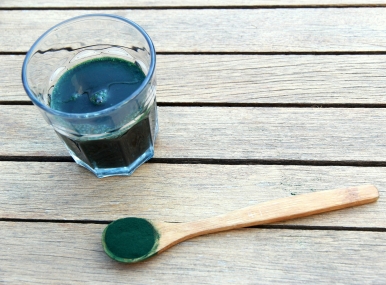What is spirulina ?
Spirulina is the common name given to blue-green algae, cyanobacteria, of the genus Arthrospira. It is a funny little microscopic algae (we speak of microalgae) in the shape of a spiral. It owes its bluish-green color to its abundant pigments, which are responsible for capturing the sun's light energy :
- chlorophyll ;
- the phycocyanine ;
- carotenoids.
Spirulina, which has existed for several billion years, develops naturally when a number of conditions are met :
- a strong sunshine and in a prolonged way;
- a slightly salty water;
- water rich in minerals and bicarbonate;
- warm water.
All these conditions are generally found in lakes or ponds in tropical areas (Africa, Asia, North America).
An ancestral food
Spirulina has been part of man's diet for thousands of years, all over the world and particularly in Mexico and Africa.
Its extremely rich composition in proteins, vitamins, iron, essential fatty acids and minerals makes it a special food (or superfood) which explains why the interest in it is not new. It has even been considered for about fifty years as a solution to fight against hunger in the world.
Today, spirulina is the star product of the food industry, it is found everywhere :
- in food supplements ;
- in energy bars
- in sports drinks;
- in pet food.
Spirulina is also a very popular ingredient in cosmetic products (creams, beauty masks, ...).
An extraordinary composition
Spirulina is composed of :
- 65% protein (phycocyanin) : for its antioxidant action;
- 20% sugars (spirulina) : to stimulate the immune system;
- 6% minerals (calcium, magnesium, selenium) : to strengthen the body in the same way as cow's milk;
- 5% fat (gamma-linoleic acid) : to meet the essential needs of the body and reduce inflammation and aging of the body;
- 3% water;
- 1% of compounds of medicinal interest (superoxide dismutase, chlorophyll, vitamin E, vitamin B12, iron, beta-carotene and carotenoid pigments) : all these compounds have an antioxidant action.
Proteins are present in quantity (2 times more than in meat) and are of good quality. They contain amino acids essential to the functioning of our body. Thus, the consumption of spirulina is suitable for everyone (and especially for athletes) with an oral intake of 3 to 10 grams of spirulina per day during a 3 week cure. The daily dose can be increased to 20 grams per day for athletes.
What are the health benefits ?
Spirulina, by its composition, has a set of medicinal virtues recognized since 1974 by the American FDA. It brings a benefit in the management of various pathologies :
- Iron deficiency anemia : spirulina is a source of highly assimilable iron;
- The chronic bronchopneumopathy or COPD : the superoxide dismutase of spirulina can reduce inflammation and oxidative stress;
- The fragility of the immune system : the phycocyanin in spirulina stimulates the immune system's defenses which become more effective;
- Undernutrition : the proteins and nutrients present in quantity and quality in spirulina can solve the problems of undernutrition;
- Hyperglycemia (diabetes) : spirulina seems to reduce the abnormally high level of sugar in the blood either on an empty stomach or after a meal;
- Sickle cell disease : spirulina supplementation seems to improve the nutritional status of sickle cell patients;
- Fatigue : the proteins, vitamins and minerals in spirulina have a beneficial effect on fatigue. The antioxidant properties allow to significantly reduce chronic fatigue;
- Cardiovascular diseases : Spirulina reduces the level of bad LDL cholesterol and triglycerides while increasing the level of good HDL cholesterol;
- Physical performance : the increase in oxygen consumption by physical effort and the formation of free radicals that result can be detoxified by the consumption of spirulina. Spirulina can also improve healing following an injury;
- Digestive health : phycocyanin helps protect the liver while spirulina helps improve the microbiota and immunological functions of the intestine;
- Overweight and obesity : spirulina improves hypertension, vascular function and weight loss;
- Allergic rhinitis : spirulina decreases the release of histamines, it helps to mitigate the allergic reaction found in rhinitis;
- Premature aging of the skin : beta-carotenes and carotenoid pigments act as a screen by protecting the skin from sunlight. The production of free radicals is therefore reduced, especially since the antioxidant properties of spirulina help eliminate them.
Updated on 10 February 2023 at 22:31







